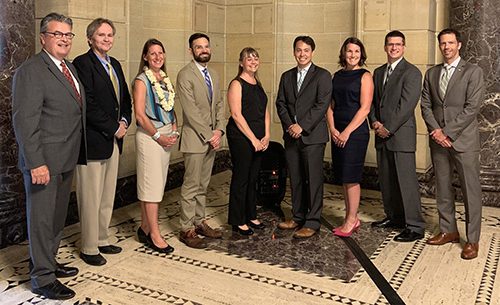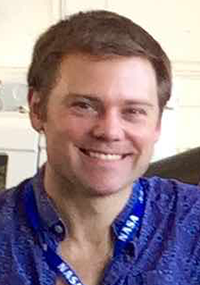A .gov website belongs to an official government organization in the United States.
A lock () or https:// means you've safely connected to the .gov website. Share sensitive information only on official, secure websites.
2 July 2019

The White House named three Boulder atmospheric scientists among 309 recipients of the Presidential Early Career Awards for Scientists and Engineers. The PECASE is the highest honor bestowed by the U.S government on science and engineering professionals in the early stages of their research careers. ESRL Chemical Sciences Division scientists Brian McDonald and Andrew Rollins were among those named.
Brian McDonald and Andrew Rollins were both working with the Cooperative Institute for Research in Environmental Sciences (CIRES) at the University of Colorado Boulder when nominated; Rollins is now a federal scientist at NOAA. Their colleague Andrew Hoell of NOAA working at the ESRL Physical Sciences Division was also honored.
Brian McDonald has earned attention in recent years for elegant work to understand the sources of atmospheric pollutants that contribute to poor air quality and impact climate. He and his colleagues published work in Science, for example, finding that consumer and industrial products now rival vehicles as the top source of urban air pollution.

Nomination excerpt: Dr. Brian McDonald has significantly advanced the development and evaluation of emissions inventories, work that serves the needs of industries, regulators, communities, and other scientists. His innovative and elegant inventory approaches combine high quality ambient observations with publicly available source activity data. His work – quantifying detailed emissions from motor vehicles, oil and gas production, and consumer products – provides a solid scientific understanding critical to those who must adhere to or set health-based air pollution regulations. Good decisions come from accurate information. Dr. McDonald's research is improving emissions inventories and informing better decisions. His innovations promise continued improvement for NOAA, its federal agency partners, and others in science and decision making. Dr. McDonald's skills as a communicator and bridge-builder are key to making his research relevant to others, and he is further serving society by helping to train the next generation of scientists.
Andrew Rollins has developed upper atmosphere instruments that can detect very small quantities of water vapor, an important greenhouse gas, and sulfur dioxide from anthropogenic and natural sources including volcanic eruptions, both of which influence Earth's climate. Rollins significantly contributed to the scientific community through his leadership of an international intercomparison of water vapor instruments that resolved decades-long discrepancies among different techniques. An excellent example of his accomplishments is published in Geophysical Research Letters: The role of sulfur dioxide in stratospheric aerosol formation evaluated using in-situ measurements in the tropical lower stratosphere.

Nomination excerpt: Dr. Andrew Rollins is an emerging young scientist who has undertaken leadership roles in a series of high-risk, high-reward research efforts to develop cutting edge technologies needed for studying important problems in climate and air quality research. He has been very successful with water vapor and is continuing his stellar record with the study of sulfur dioxide. The calibrated water vapor measurements in the remote Pacific have clarified cirrus microphysical issues in the UTLS. Having substantially increased sensitivity in measuring sulfur will provide exciting opportunities for Dr. Rollins to address unanswered questions about the role of sulfur in future climate and air quality. His new research will have high rewards for NOAA's mission and society’s interests. A PECASE award will appropriately recognize Dr. Rollins' accomplishments and strengthen his ability to extend his contributions at the cutting edge of atmospheric science.
"Brian McDonald and Andrew Rollins are innovative and accomplished early career scientists, credited with major advances in atmospheric modeling and observational systems," said David Fahey, Director of the NOAA ESRL Chemical Sciences Division. "Winning these PECASE Awards is highly satisfying news."
Established in 1996, the PECASE acknowledges the contributions scientists and engineers have made to the advancement of science, technology, engineering, and mathematics (STEM) education and to community service as demonstrated by scientific leadership, public education, and community outreach.